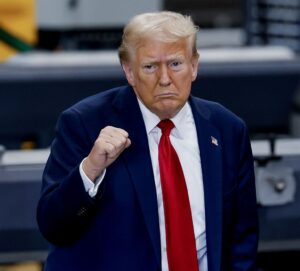Bank of Portugal navigates trail of uncertainty
The increase in tariffs imposed by the US could have an impact of 1.1% of Portugal’s GDP, especially in the first two years of implementation, according to projections by the Bank of Portugal (BdP).
The scenario considered was a “25 percentage point increase in tariffs imposed by the US, particularly on goods imported from the European Union (EU), accompanied by retaliation of the same magnitude by affected countries”, according to the March Economic Bulletin released yesterday.
For the Eurozone, this increase in tariffs “could result in a cumulative contraction of the euro area’s Gross Domestic Product (GDP) of between 0.5% and 0.7% after three years, with a more significant impact in the first year”.
For Portugal, the overall impact of the shocks considered in this scenario points to a “cumulative reduction in GDP of around 1.1% at the end of three years, with the effects concentrated in the first two years”.
BdP governor Mário Centeno explained at the presentation of this Bulletin that the impact in Portugal could be close to one percentage point less in growth in 2025.
The estimated impact on the annual change in Portuguese GDP is -0.9 percentage points (p.p.) in 2025, -0.4 p.p. in 2026 and 0.2 p.p. in 2027.
In Centeno’s words: “It is an undesirable impact, not a necessary one, because these kinds of trade wars will not take the world economy in the right direction. But it’s a scenario that is ahead of us.”
The European Central Bank (ECB) has also warned that the US imposing 25% tariffs on European imports could reduce eurozone growth by up to 0.3% in the first year as well as increase inflation.
If the European Union (EU) responds by increasing tariffs on imports from the United States (US), this impact would increase to around half a percentage point, ECB president Christine Lagarde told MEPs yesterday, insisting that these estimates are subject to “considerable uncertainty” (as is everything related to the decisions and actions of Donald Trump’s US administration).
As such, the inflation outlook is “significantly more uncertain”, and the ECB estimates that, in the short term, EU retaliation and a weaker euro exchange rate – resulting from lower demand for European products in the US – “could increase inflation by approximately half a percentage point”.
“It is clear that the high level of political uncertainty requires us to remain vigilant and ready to act to protect price stability,” she said during a session in the European Parliament where MEPs asked her to address the impact of the looming trade war.
The ECB president emphasised that the change in Washington’s policies has led to “exceptionally high” levels of uncertainty about the direction of trade policy, and that the eurozone is “particularly exposed” to these policies.
She considered, however, that the European response should be “more, not less, trade integration” with partners both outside and inside the EU itself and emphasised that the ECB’s analysis suggests that greater integration with the rest of the world “could more than compensate for the losses suffered from unilateral tariffs, including retaliation”.
Regarding the ECB’s interest rate policy, Lagarde insisted that the central bank “is determined to ensure that inflation stabilises sustainably at its medium-term target of 2%” but cannot commit in advance to a specific rate path, especially in the current uncertain conditions.
LUSA




















